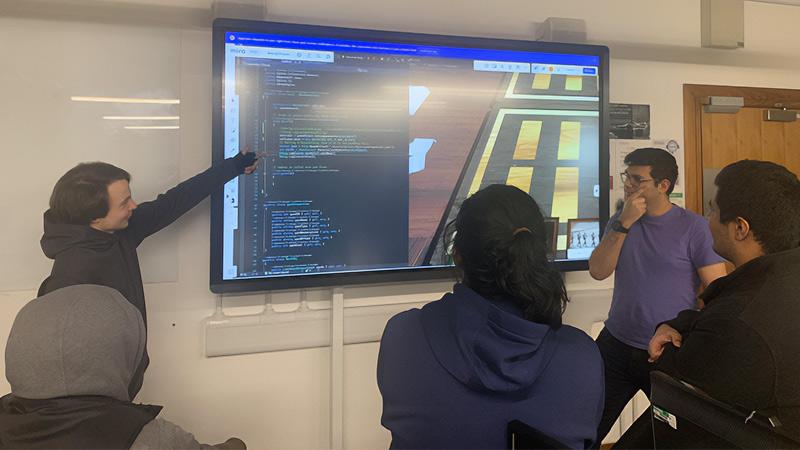Two teams from the University of Westminster, including 12 students from the Computer Games Development BSc course, have taken part in the Imperial War Museum’s (IWM) Games Jam between 13-20 February. The competition was organised in partnership with the Historical Games Network, University of Glasgow’s Games and Gaming Lab (GGLAB), and World of Tanks.

The two teams, named The Fun Brigade and Astral Finish, were challenged to create an innovative war video game inspired by certain exhibition objects from IWM’s collections as part of its War Games season. The games had to feature unexpected and under-explored stories of conflict with creativity, empathy and diversity in their design. Entries were judged by a panel of experts from IWM and its partners in two categories, including Best Playable Game and the Best Game Concept.
The Fun Brigade included Year 1 and Year 2 students, who have created a video game titled Sorrow. The game achieved 6th place in the overall ranking, and 3rd place in the Playability/Presentation category. Sorrow was inspired by the theme of White Poppy, an originally anti-war symbol. The team aimed to create an emotive experience that details how the loss and sacrifice felt by people during 1930s Britain, which according to them may have affected perceptions leading up to World War 2.
Oliver Guy, Team Leader of The Fun Brigade Team said: “Participating in this competition was exciting due to the unique aspects of creating a game that provoked opinions of war. I was able to develop my skills and experience in a technical capacity with regards to the Unity game engine [a cross-platform game engine] and programming in C# [a type of programming language]. We have received positive feedback that has made working on the project worthwhile and demonstrated the effectiveness of our initial vision.”
Ines Lobo, the Developer of the team, said: “Games are always a way to express our feelings or provide players with a new world to experiment. So, when creating Sorrow during this competition, it became more than another game jam. Exploring the world that the White Poppy could bring was challenging and rewarding. I gained new programming skills and learned a lot about the past, and I feel incredibly excited to show others the world that our team put together.”
Sorrow also received positive feedback from the judges; one of them commented: “This is very impressive for a game jam game and the team have done incredibly well in sourcing assets, developing the levels and putting together such a complete game in a short amount of time. The game adopts a traditional approach to storytelling, the use of letters and the interactive flashbacks are done well and a nice addition to bring together the issues around the First and Second World War.”
The other team, Astral Finish, was made up of Year 3 students, who have created the Generals Gambit game following the theme of the Spitfire, and achieved 15th place in the ranking. Avoiding a more obvious shooter type of game, the team developed a card strategy game with the spitfire being used as the trump card. Their idea was to impose a sense of responsibility and weight behind the players actions, as many soldiers' fates were decided by commanders and their strategies during the war.
Bartosz Tarasiewicz, Team Leader of the Astral Finish Team, said: “The IWM games jam was less of a competition to me and more of a test to see how well me and my team can work together, what our strengths and weakness are and how I could cover for those as a manager in future projects. I learnt a great lot when it comes to managing the team and designing a project that synergises well with them. Now that I know the skills my teammates want to invest in, I can be a better leader and point them in a better direction.”
Talking about the Westminster teams and IWM game jam, Markos Mentzelopoulos, Senior Lecturer and Course Leader of the Computer Games Development BSc course, said: "We are incredibly proud of both teams for their exceptional performance in the IWM Game Jam. Their innovative approach to game design and development exemplifies the core values of our Computer Games Development BSc course, which emphasizes teamwork, and cutting-edge technology. Our program offers wealth of opportunities for students to explore their passions and develop the skills needed to succeed in the highly competitive game development industry. We are thrilled to see our students achieve such great success and look forward to supporting them as they continue to push boundaries of game development."
Learn more about the Computer Games Development BSc course at the University of Westminster.









